SCOTUS Denies Fast Track of Trump Immunity Claim
They've punted to the DC Circuit.
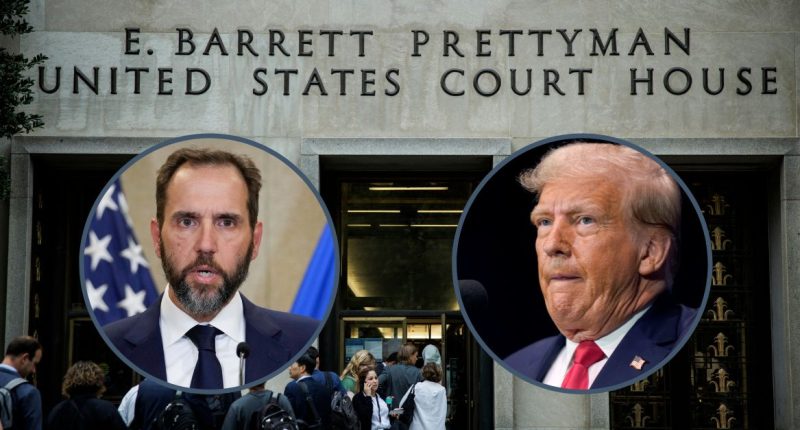
Robert Barnes, WaPo (“Supreme Court won’t expedite ruling on Trump’s immunity claim“):
The Supreme Court on Friday said it will not fast-track consideration of Donald Trump’s claim that he is immune from prosecution for actions he took as president, a question crucial to whether he can be put on trial for plotting to overturn the results of the 2020 election.
The court’s one-sentence order offered no explanation for turning down special counsel Jack Smith’s request for an expedited review, which he said was needed to keep Trump’s election-obstruction trial on track for early March. The order can be seen as, at least, a limited and temporary win for Trump, who has actively worked to delay the legal proceedings against him as he campaigns again for the Republican presidential nomination.
The issue of presidential immunity will likely return to the Supreme Court, but not before a federal appeals court in Washington reviews a district judge’s ruling earlier this month that flatly rejected Trump’s claims. That court has expedited its proceedings, and will hold arguments on Jan. 9.
It is customary for the Supreme Court not to explain its reasonings for denying a motion for expedited review, which Smith acknowledged was an “extraordinary” request being made in an extraordinary case. There were no noted dissents and no indication that Justice Clarence Thomas had recused himself, despite calls from some congressional Democrats that he do so because of his wife’s involvement in challenging the results of the 2020 election.
Smith had asked the justices to short-circuit the normal appellate process and quickly settle the question of presidential criminal immunity, which the Supreme Court has not previously been called upon to resolve. He said public interest required intervention now, to avoid delaying Trump’s D.C. federal trial.
The scheduled start date is March 4, a day before the Super Tuesday primary contests, in which Trump is the clear GOP front-runner.
[…]
Trump’s appeal of that order will now proceed first in the U.S. Court of Appeals for the D.C. Circuit, with Trump’s briefs due Saturday and a randomly chosen panel already named to hear the case. The judges are Karen LeCraft Henderson, appointed to the court in 1990 by President George H.W. Bush, and two more recent additions chosen by Biden: J. Michelle Childs and Florence Y. Pan.
The special counsel had argued that since only the Supreme Court can definitively answer the question of a chief executive’s immunity for actions taken while in office, the justices should act now.
“Whether a former President of the United States enjoys absolute immunity from criminal prosecution for a conspiracy to overturn an election, and thereby prevent the lawful winner from taking office, is an issue of great constitutional moment,” Smith said in his filing. “This Court’s immediate review of that question is the only way to achieve its timely and definitive resolution.”
While it is relatively rare for the justices to accepta case before an appeals court has reviewed it, Smith noted that the court has done it before in important cases. One such case was another test of presidential power.
In 1974’s U.S. v. Nixon, the court took up and decided within weeks the question of whether President Richard M. Nixon had the right to withhold subpoenaed recordings of conversations in the White House. Nixon resigned in the wake of the unanimous decision that he must turn over the recordings.
Adam Liptak, NYT (“Supreme Court Won’t Hear Case on Trump’s Immunity Defense for Now“) adds:
The decision to defer consideration of a central issue in the case was a major practical victory for Mr. Trump, whose lawyers have consistently sought to delay criminal cases against him around the country.
It is unclear what the court’s order will mean for the timing of the trial, which is scheduled to start on March 4, though it makes postponement more likely. The case will now move forward in an appeals court, which has put it on a fast track, and most likely return to the Supreme Court in the coming weeks or months.
[…]
Any significant delays could plunge the trial into the heart of the 2024 campaign season or push it past the election, when Mr. Trump could order the charges be dropped if he wins the presidency.
[…]
The panel will probably issue a prompt decision. If Mr. Trump loses, he could ask the full appeals court to rehear the case. In the end, the losing side will in all likelihood return to the Supreme Court.
Smith’s argument strikes me as reasonable and straightforward and I’m disappointed in the result. The Supremes can be rather inscrutable, though, and seldom explains its decisions not to take a case.
NPR‘s coverage of the case (“The Supreme Court will not fast-track the request to review Trump’s immunity“) offers no additional insights other than this:
University of Texas law professor Steve Vladeck said the Supreme Court had agreed to fast-track appeals in 19 other cases over the past four years, including disputes about abortion, affirmative action and Biden’s student loan forgiveness program.
Given the gravity of this case, it seems on its face that it should have agreed to a 20th.
SCOTUSBlog’s Amy Howe (“Court won’t hear Trump immunity dispute now“) offers this:
Although there is no way to know why they opted not to intervene at this point, one possibility may be that they believe that the D.C. Circuit will move quickly not only in hearing oral argument but also in issuing an opinion in the case, leaving the Supreme Court with enough time to review the case (albeit on an expedited basis) during its current term, as Smith had sought.
While I suppose that’s possible, it’s unsatisfying. The Supreme Court, rightly, typically allows disputes to wind their way through the full process. In most matters, the trial courts are perfectly capable of adjudicating the facts and applying applicable judicial precedents. And, in almost all exceptions to that, the appeals courts have the expertise and gravitas to remedy any errors or even to establish new precedents that can stand. Sometimes, disputes among the circuits will force SCOTUS to clarify.
Here, though, we have a novel circumstance in which all parties agree will ultimately require resolution by the nation’s highest court. Given that one of the parties is not only a former President of the United States but the odds-on favorite to again by the nominee of one of our two significant political parties for that office within months, there is considerable urgency in deciding whether one of the many criminal trials that are in motion against him can proceed.
______________________
Interesting, if almost certainly a mere sidebar: Volokh Conspiracy‘s Steven Calabresi, the Clayton J. & Henry R. Barber Professor of Law at Northwestern Pritzker School of Law, offers this:
I won my campaign to get the Supreme Court to deny Special Counsel Jack Smith’s petition for certiorari before judgement. I had argued in an amicus brief that Jack Smith lacked standing to represent the United States because his appointment as Special Counsel was unconstitutional. I therefore urged the Court to deny his petition, which it did.
I strongly suspect that was not the basis of the denial. Calebresi offers a more detailed explanation, which I find somewhat plausible, here. He’s been making the argument for years that, since the Independent Counsel statute expired in 1999, all of those appointed since with similar powers have been acting without legal authority.

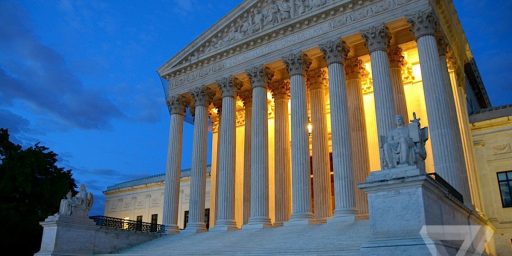
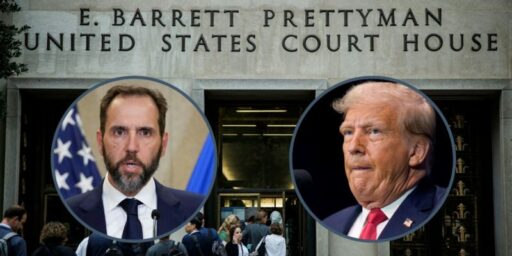
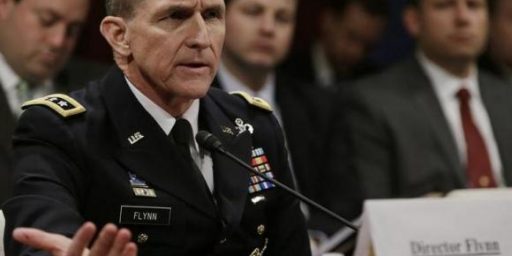
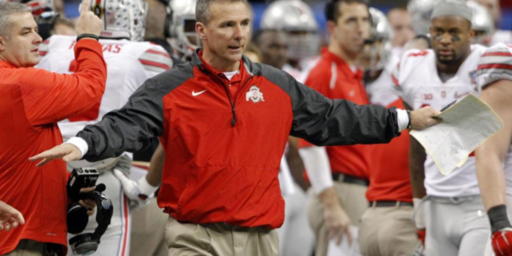
Both Vladeck and Ken White were not outraged about this. White in particular thought it would have been pretty surprising if they had taken this case–especially with the circuit hearing set for Jan 9.
Vladeck notes the circuit can move this along in a way similar to the CO Supreme Court by staying it’s decision for only 14 days if the USSC doesnt take up the case.
It’s also possible that, depending on the circuit outcome, they may choose to let it stand.
@mattbernius: Interesting. I can’t find White’s comments on this.
@James Joyner: They are on Blue Sky in a response.
Here is what he wrote:
He also covered some of that in one of this week’s Serious Trouble episodes.
The issue of “can the president be subject to legal process” should have been decided 248 years ago, either by direct statement in the Constitution or by Supreme Court determination.
Instead the DOJ relies on the contorted, non-judicial opinion of their lawyers.
I will admit that I have limited ability to make an informed judgment on this move by the Court.
Yet I will note that the ongoing behavior of many (allegedly smart and responsible) people in power as if the current situation with Trump can be handled like it is normal is infuriating. It has a bit of “Nero fiddling with Rome burns” vibes.
Based on the reporting about the Dobbs case and the lack of explanation that this is nothing more than a corrupt screw-job. This is one of the most important cases for them to decide. If they decide he has absolute immunity we’re done. Country over.
The Roberts court: not just corrupt, but also cowardly and useless. Jack Smith forgot to send Thomas a pair of first class tickets to a Jackson Hole resort.
@Beth: I think it’s pretty clear that he has—and in my judgment, should have—permanent immunity for official acts as President. The lower court judge has ruled that his actions related to disputing the 2020 election were done in his private capacity as a political candidate, and that he’s not immune for those. I’m persuadable either way on that count.
Regardless, to the extent he violated black letter criminal law such as the Insurrection Act, it would make no sense that he would have immunity for that, official business or not.
Conservatives, who claim to want small government, favor dictatorial power for the head guy, while liberals, who supposedly favor big government, fear excess executive power. Entertaining.
Without getting into the legalities, I think the OLC opinion that a sitting president can’t be prosecuted by DoJ is understandable, but wrong. (The argument is basically the man is too important and too busy to be distracted. Trump reportedly spent a lot of time golfing and watching TV. And he could delegate being distracted to lawyers.) But that he can never, ever be prosecuted for criminal acts if they are somehow judged official makes no sense to me at all. And I believe the Hague agrees with me. They’re just unable to extradite.
@James Joyner: We have presidents, not kings.
SCOTUS likely wants to see if the Smith and the judge lose interest in the case if the start date is push past the Super Tuesday interference that drove the scheduling.
Not to mention one of the J6 cases they’ve taken to review the interpretation of the statute will impact a few of the charges leveled against Trump if SCOTUS rules for the plain language interpretation.
repeating myself ,
Whether or not a US President is subject to legal process should have been made clear in the last 245 years.
That it wasn’t in the Constitution originally, or added by amendment only speaks to the optimistic view that a President would not stoop so low as to commit out-right crimes.
Then, of course there is our most recent former President, that defies sensibility.
So for now we are stuck with a contrived and convoluted opinion by non-judicial lawyers that leans heavily on “it would be distracting and inconvenient”.
SCOTUS should do it’s job and settle this BS right now. Tell the American people if we have a King or a mere mortal who was somehow popular.
Laura Loomer believes that this will lead directly to Trump’s assassination by the Deep State.
Speculation: I’ve heard that traditionally the Supremes weigh in when there are conflicting rulings from lower courts. Perhaps their plan, as Trump’s case is all but ridiculous, and is all but certainly to be judged so by the DC circuit, is to dodge this issue by then refusing to hear the certain to follow appeal. The claim the supreme court MUST rule on this, as the pundits all seem to believe, is questionable.
This would seem to be the easiest way to keep themselves out of the fray, and I suspect that might be what the majority of this court could be hoping for.
@JKB:
Yes, that seems likely.
@JKB: It sounds as though you are saying that The Supremes are hoping to kick the can down the road because they are…
disinclined?….
… yeah, disinclined… to rule on this question and prove for once and for all that they are “in the bag” for Trump, authoritarianism, and the destruction of representative government?
I’d normally not suspect that you were a closet old-left progressive, but your arguments seem to be losing focus these days, so it’s hard to tell what you’re intent is. I hope you regain your focus soon.
@JKB:
I’m guessing this is sarcasm… or at least I hope it is. The push for an early date had nothing to do with Super Tuesday and more about the DOJ’s attempt to have the trial as far before election day as possible once they brought charges (keeping with department policy).
Note, Smith wanted the trial to start even earlier. The decision for the March date was based on requests from the Trump team for more time (they wanted significantly more time, as in months and months–which Chutkin wasn’t going to entertain either).
Additionally, Smith is keeping the pressure up because Federal trial dates–like most trial dates–slip. Even with this pressure, this will most likely be the only trial that starts before election day. Fani Willis has already signaled that trial is unlikely to begin this year (for all the reasons that people disclosed about the complexity of that case). And who knows what will happen with the Mar A Lago documents case–but I think it’s unlikely to get started any time soon.
Yes and no. The one in question is about the application of Statute 1512 to the type of “blue collar” obstruction of a proceeding created by the invasion of the Capital Building. The argument is that was designed for more “white collar” obstruction (i.e. submitting false documents or destroying documents, etc.).
So while part of the prosecution of Trump is based on the riot itself, he also ordered his campaign to take steps that do fit the “white collar” definition (i.e., attempting to submit fake electors or the recent tapes from Michigan where they offer public officials with promises of representation if they attempt to overturn the election results). So, unless the USSC strikes down the entire law, the disruption to specifically the Trump case will be minimal*. Or at least that’s the analysis I’ve seen from a number of experts.
That said, Chutkin (or Smith, as the decision could impact the prosecution strategy) may request to hold the trial until the court rules. And, depending on the Court’s preferences, that ruling might not come down until June. This would mean the earliest the trial would start is either July or possibly early August.
Chutkin has anticipated that this would be a two month trial, meaning we might be finding the results in September or October. So this could be a really wild leadup to the election.**
* – It will be a nightmare for Jan 6th prosecutors–including anyone who reached a plea deal involving that statute. What happens there is very much up in the air, and revisiting prosecutions will almost certainly depend on who wins the election.
** – Given my recent record on legal analysis, I will share that most of this comes via Ken White and others like Steve Vladic and the Lawfare podcast. I’m mainly regurgitating here.